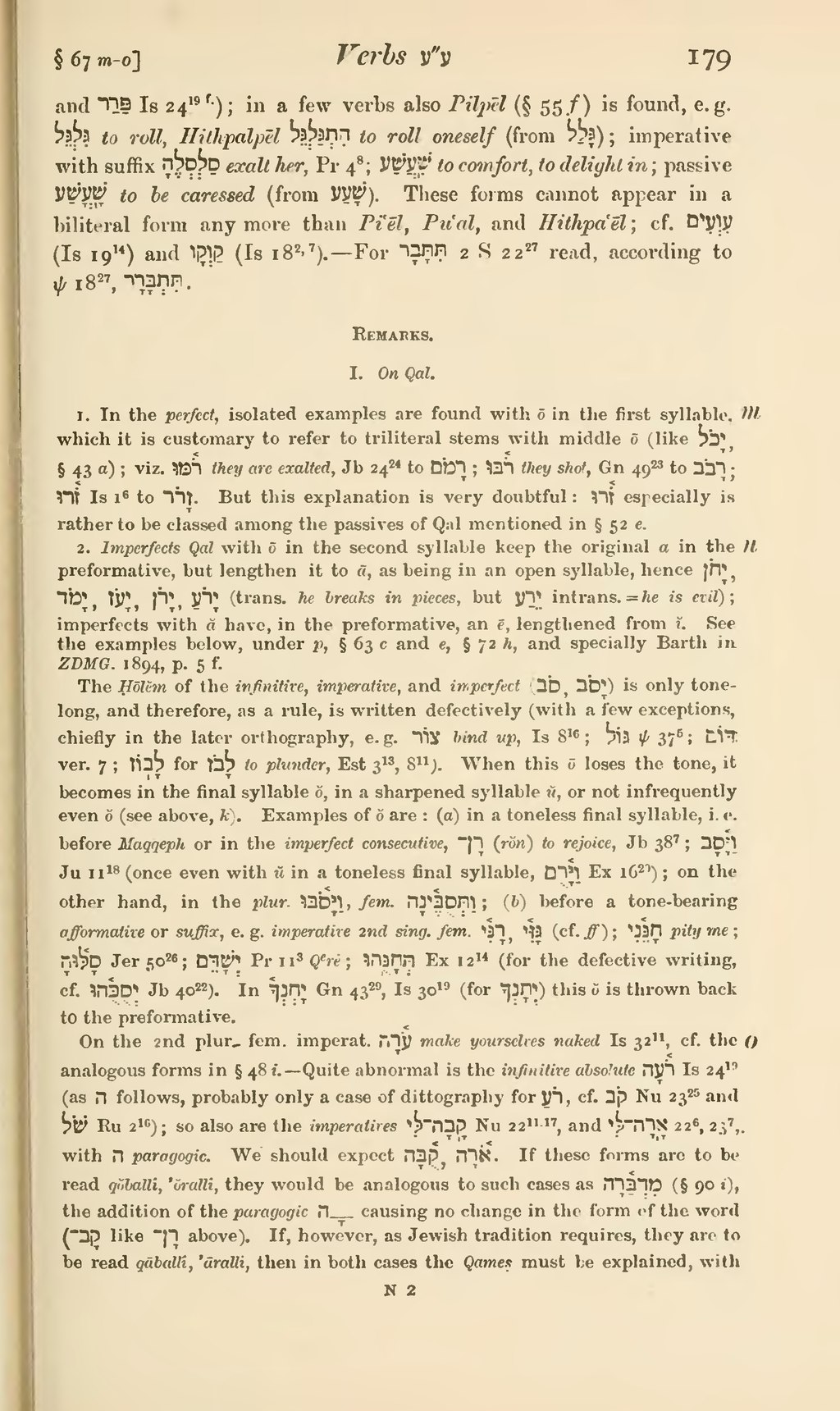and פַּרַד Is 24 f.); in a few verbs also Pilpēl (§ 55 f) is found, e.g. גִּלְגֵּל to roll, Hithpalpēl הִתְגַּלְגֵּל to roll oneself (from גָּלַל); imperative with suffix סַלְסְלֶהָ exalt her, Pr 4; שִֽׁעֲשַׁע to comfort, to delight in; passive שָֽׁעֳשַׁע to be caressed (from שָׁעַע). These forms cannot appear in a biliteral form any more than Piʿēl, Puʿal, and Hithpaʿēl; cf. עִוְעִים (Is 19) and קַוְקָו (Is 18).—For תִּתָּבָר 2 S 22 read, according to ψ 18, תִּתְבָּרָר.
Remarks
I. On Qal.
[m] 1. In the perfect, isolated examples are found with ō in the first syllable, which it is customary to refer to triliteral stems with middle ō (like יָכֹל, § 43 a); viz. רֹ֫מּוּ they are exalted, Jb 24 to רָמֹם; רֹ֫בּוּ they shot, Gn 49 to רָבֹב; זֹ֫רוּ Is 1 to זָרֹר. But this explanation is very doubtful: זֹ֫רוּ especially is rather to be classed among the passives of Qal mentioned in § 52 e.
[n] 2. Imperfects Qal with ō in the second syllable keep the original a in the preformative, but lengthen it to ā, as being in an open syllable, hence יָחֹן, יָמֹד, יָעֹז, יָרֹן, יָרֹעַ (trans. he breaks in pieces, but יֵרַע intrans.= he is evil); imperfects with ă have, in the preformative, an ē, lengthened from ĭ. See the examples below, under p, § 63 c and e, § 72 h, and specially Barth in ZDMG. 1894, p. 5 f.
The Ḥōlĕm of the infinitive, imperative, and imperfect (סֹב, יָסֹב) is only tone-long, and therefore, as a rule, is written defectively (with a few exceptions, chiefly in the later orthography, e.g. צוֹר bind up, Is 8; גּוֹל ψ 37; דּוֹם ver. 7; לָבֽוֹז for לָבֹז to plunder, Est 3, 8). When this ō loses the tone, it becomes in the final syllable ŏ, in a sharpened syllable ŭ, or not infrequently even ŏ (see above, k). Examples of ŏ are: (a) in a toneless final syllable, i.e. before Maqqeph or in the imperfect consecutive, רָן־ (rŏn) to rejoice, Jb 38; וַיָ֫סָב Ju 11 (once even with ŭ in a toneless final syllable, וַיָּ֫רֻם Ex 16); on the other hand, in the plur. וַיָּסֹ֫בּוּ, fem. וַתְּסֻבֶּ֫ינָה; (b) before a tone-bearing afformative or suffix, e.g. imperative 2nd sing. fem. רָנִּ֫י, גָּזִּ֫י (cf. ff); חָנֵּ֫נִי pity me; סָלּ֫וּהָ Jer 50; יְשָׁדֵּם Pr 11 Qerê; תְּחָגֻּֽהוּ Ex 12 (for the defective writing, cf. יְסֻבֻּ֫הוּ Jb 40). In יָחְנְךָ֫ Gn 43, Is 30 (for יִחָנְךָ) this ŏ is thrown back to the preformative.
[o] On the 2nd plur. fem. imperat. עֹ֫רָה make yourselves naked Is 32, cf. the analogous forms in § 48 i.-Quite abnormal is the infinitive absolute רֹ֫עָה Is 24 (as ה follows, probably only a case of dittography for רֹעַ, cf. קֹב Nu 23 and שֹׁל Ru 2); so also are the imperatives קָֽבָה־לִּי Nu 22, and אָֽרָה־לִּי 22, 23, with ה paragogic. We should expect קֻ֫בָּה, אֹ֫רָה. If these forms are to be read qŏballî, ʾŏrallî, they would be analogous to such cases as מִדְבַּ֫רָה (§ 90 i), the addition of the paragogic ־ָה causing no change in the form of the word (קָב־ like רָן־ above). If, however, as Jewish tradition requires, they are to be read qāballî, ʾārallî, then in both cases the Qameṣ must be explained, with

